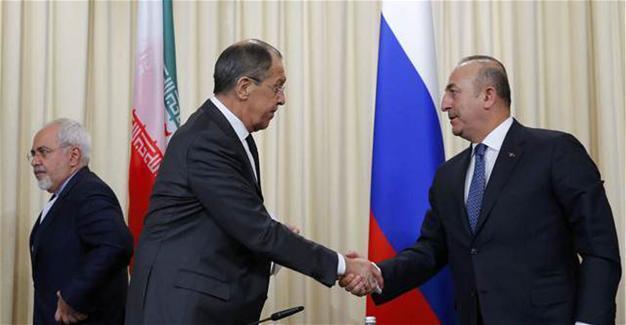Russia, Turkey and Iran agree on joint Syria action
MOSCOW
 Russia, Turkey and Iran have agreed to jointly act on Syria, one day after the Russian ambassador to Turkey was assassinated in the Turkish capital, as evacuations from the besieged parts of eastern Aleppo continued on Dec. 20.
Russia, Turkey and Iran have agreed to jointly act on Syria, one day after the Russian ambassador to Turkey was assassinated in the Turkish capital, as evacuations from the besieged parts of eastern Aleppo continued on Dec. 20. Russian Foreign Minister Sergei Lavrov said Dec. 20 that Russia, Iran and Turkey were ready to act as guarantors in a peace deal between the Syrian government and the opposition.
Lavrov told reporters in Moscow after a tripartite meeting that the three ministers had signed a joint statement which states that Russia, Iran and Turkey “express their willingness to help the Syrian government and the opposition draft an agreement and act as its guarantors.”
The meeting came one day after Russian Ambassador to Ankara Andrey Karlov was assassinated at an art exhibition in the capital by a policeman who shouted: “Don’t forget Aleppo! Don’t forget Syria!”
Speaking after Lavrov, Turkish Foreign Minister Mevlüt Çavuşoğlu said Turkey would continue its efforts for a political solution in Syria, for the widening of a cease-fire across the country and for the interrupted supply of humanitarian aid.
The three ministers gathered in Moscow to discuss the situation in Syria and the evacuations in Aleppo.
Prior to Lavrov’s announcement, Russian Defense Minister Sergei Shoigu, said on Dec. 20 that Russian experts had drawn up a “Moscow Declaration” that amounted to a roadmap to end the Syria crisis and that he hoped that Turkey and Iran could support the document.
Shoigu, speaking at meetings in Moscow with his Iranian and Turkish counterparts, said the document was aimed at achieving a cease-fire in Syria.
“All previous attempts by the United States and its partners to agree on coordinated actions were doomed to failure. None of them wielded real influence over the situation on the ground,” said Shoigu.
A total 37,500 people have been evacuated from Aleppo so far and the goal is to complete all evacuations by Dec. 21, Çavuşoğlu wrote on Twitter on Dec. 20, while the International Committee of the Red Cross (ICRC) said 25,000 people had been bused out of east Aleppo.
“Yesterday [Dec. 19] only, we evacuated 15,000 people from east Aleppo. If we consider those evacuated on [Dec. 20] too, then the total should be 25,000,” ICRC spokeswoman Ingy Sedky told AFP.
She said “thousands” of others were still waiting to be bussed out, amid a lack of information on the numbers of civilians and fighters remaining in east Aleppo.
The ICRC has been overseeing the complex evacuation deal for Aleppo, brokered by government backer Russia and rebel supporter Turkey.
After a month-long assault by government forces, thousands of civilians and rebels left the last remaining opposition-held districts of east Aleppo on Dec. 15 at the start of the evacuations.
The deal was suspended until early Dec. 19 over government demands for the simultaneous evacuation of two Shiite-majority villages in northwest Syria besieged by rebels.
Sedky confirmed that 750 people had thus far been bussed out of the villages of al-Fuaa and Kafraya, in Syria’s mainly rebel-held Idlib province, as part of the deal.
Meanwhile, the Syrian government authorized the United Nations to send an additional 20 staff to east Aleppo, where they will monitor the ongoing evacuation of thousands of people, a U.N. spokesman said on Dec. 20.
“The task is to monitor and observe the evacuations,” Jens Laerke told a news briefing in Geneva
This came one day after, the U.N.’s Syria envoy, Staffan de Mistura, said Dec. 19 he had planned peace talks for February 2017 in Geneva.
Before the start of the tripartite meeting in Moscow, Lavrov and Çavuşoğlu laid flowers on the portrait of Karlov.
The Russian minister said in televised comments that Russian President Vladimir Putin and Turkish President Recep Tayyip Erdoğan late on Dec. 19 “agreed this tragedy makes us more decisive in fighting terrorism and makes our today’s meeting even more important.”
Lavrov said Moscow was willing to seek agreements that would improve the humanitarian situation in Syria and help political procession but “will not offer any concession to terrorists.”
















